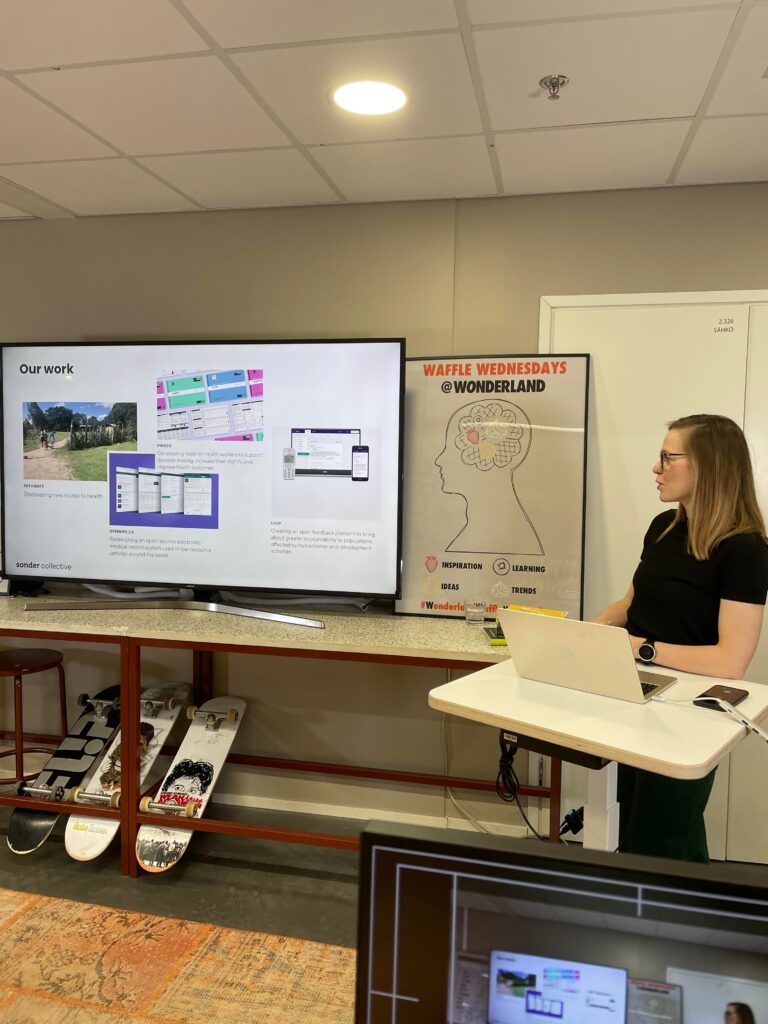Melanie Wendland came to last February´s Waffle Wednesday to share their journey of rethinking design consultancies and how they are using co-operative as their business model. Melanie Wendland is co-founder of Sonder Collective and works there as a designer.
Sonder Collective is a global collective of freelancers, mainly designers and researchers, who are deeply passionate about making positive social changes. They focus exclusively on projects in the social sector, where they are rethinking systems, solutions and services for more fair and equitable future.
Sonder is using human-centered design thinking, system design, research and innovation processes. They have partnered up with organizations like charities, foundations, NGO’s and other public sector partners. Together, they taggle complex issues in areas such as global health, peace building-, humanitarian- and social causes.
For example, they´re working on “Pathways”, a four-year research and innovation project in Kenya, India and Nigeria. This project looks at how social-, environmental- and cultural factors affects women´s access to healthcare. It involves a lot of research to uncover barriers and create targeted human centered service solutions for better healthcare services.
Melanie described their motivation to create a co-operative network of freelancers by referencing to a quote by Kate Raworth “Inequality is not an economic necessity: it is a design failure.”
Wendland emphasizes that designers should consider their role in addressing inequality when working in systems.
So, what are the issues in traditional consultancy?
Designers in traditional consulting often face issues like geographical distance. “Company does a project somewhere in India, but we would be here in the office thinking about the problems at the other side of the world.”
Companies often have strict design processes and branding which can possibly lead to limited innovation and creativity.
Balancing a company´s profits with community impact is tricky. “How do we prioritize the interest of the companies and how do we prioritize the impact in community”.
Often when companies are commissioned to do the work at the social sector, innovation process would end to the concept and the companies are left with great ideas but struggles with implementation.
Another issue in traditional consulting is that often people would get burned out due to extensive travel and juggling multiple projects.
How all this translated to founding Sonder Collective?
“How to build an organization where we put the values first, reshape the business model and introduce different type of management practice?”
Melanie and her team introduced a co-operative model where members jointly own and democratically control the business to meet their shared needs.
This co-operative structure allows flexibility and evolution. As a loose network, Sonder Collective constantly asks, “how can we evolve and change this year to better meet the needs of our members?”
Their business approach is inspired by economist Kate Raworth´s book, “Doughnut Economics”. Although not directly addressing climate issues, they aim to align their business model with social foundations mentioned in Raworth´s book.
At Sonder Collective, 100% of the surplus is reinvested into the co-operative, and members decide how to use the funds.
In traditional setups, designers often find themselves too distant from the real issues and the communities they aim to serve. Sonder Collective introduced a method called “holacracy,” a way of running things where authority and decision-making are given to teams that organize themselves, rather than having a strict top-down management system.
Within holacracy, roles are assigned to individuals, each of whom gains the autonomy to make independent decisions associated with their designated roles.
Live video of the event can be found here.
Are you interested to become speaker at Waffle Wednesday hybrid event?
Send us an email at hello@wonderlandwork.fi

